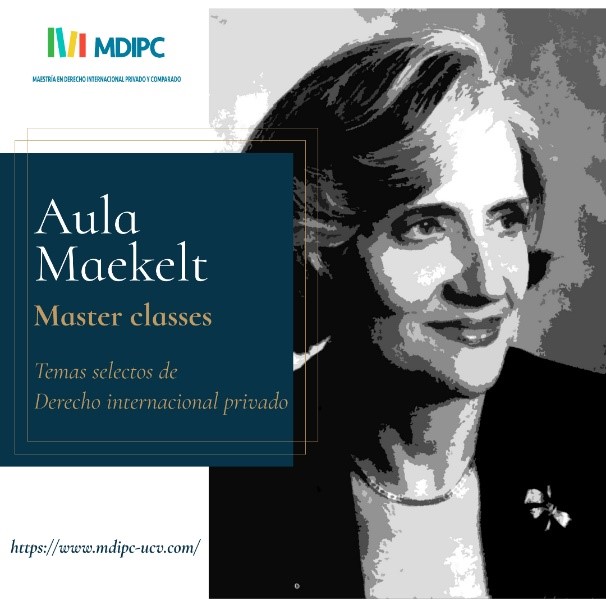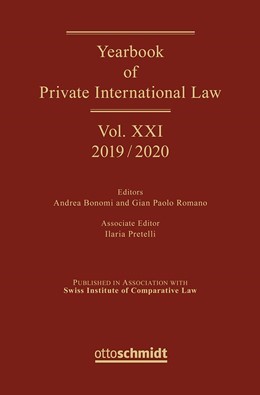Views
Nothing Found
Sorry, no posts matched your criteria
News
Venezuelan PIL Master Classes
by José Antonio Briceño Laborí, Professor of Private International Law, Universidad Central de Venezuela y Universidad Católica Andrés Bello

The Master’s Program in Private International Law and Comparative Law at the Universidad Central de Venezuela started on October 1st a series of conferences titled “Master Classes – Selected Topics on Private International Law” held in the Aula Maekelt (Maekelt Classroom), named in honor of the beloved late professor Tatiana B. de Maekelt. The conferences will be held in Spanish (unless otherwise indicated), every fifteen days through the application Google Meet (or other virtual conference application).
The Master Classes were inaugurated with a lecture by Professor Eugenio Hernández-Bretón titled “Scope of territorial application of data protection laws: a ‘revived’ conflict of laws?” where professor Hernández-Bretón explained the problems posed by the territoriality of data protection laws and how they can be solved through the principles of Private International Law. This opened a fruitful discussion among the attendees.
The next lecture will be held on October 15 at 4:00 p.m. (Venezuelan Time) by Professor Andrés Carrasquero Stolk on the subject “Enforcement immunity from judgements and awards against Venezuela”. If you want to attend this Master Class you can email the Master’s Program at mdipr.ucv@gmail.com, where they will give you all the information.
To stay current on the future activities of the Master’s Program, you can follow it on Twitter, Instagram, Facebook and LinkedIn.
Out now: Yearbook of Private International Law XXI (2019/2020)

TABLE OF CONTENTS
________________
Foreword …………………………………………………………………………………………… xi
Abbreviations …………………………………………………………………………………… xiii
Doctrine
Janeen CARRUTHERS
Discerning the Meaning of “Habitual Residence of the Child” in
UK Courts – A Case for the Oracle of Delphi ……………………………………… 1
Christian KOHLER
The EU Succession Regulation before the German Courts 2016-2019 ….. 37
Mihail DANOV
Cross-Border Litigation – New Data, Initial Brexit Implications in
England and Wales and Long-Term Policy Choices …………………………… 57
Nikitas E. HATZIMIHAIL
On the Doctrinal Beginnings of the Conflict of Laws ……………………….. 101
Interim Measures in International Commercial Litigation
Proceedings of the SICL’s 31st Private International Law Day –
Lausanne, 23 May 2019
Andrea BONOMI
Interim Measures at the Crossroads of International Litigation and
Arbitration – Some Remarks on Concurrent Jurisdiction and Cross-
Border Enforcement ……………………………………………………………………… 137
Alexander LAYTON
Interim Measures in English Law and their Circulation …………………….. 159
Sandrine GIROUD / Noémie RAETZO
The Recognition and Enforcement of Foreign Interim Measures
in Switzerland ……………………………………………………………………………… 175
Ilaria PRETELLI
The Law Applicable to Provisional and Protective Measures – With
a Focus on the EU System of Ancillary Reliefs ………………………………… 197
Gilles CUNIBERTI
Jurisdiction to Grant Interim Measures in Support of Arbitration –
The Influence of European Law …………………………………………………….. 225
Laurent HIRSCH
Swiss Practice of Interim Relief in International Arbitration ……………… 237
Karim EL CHAZLI / Ahmed HABIB
Interim Measures in International Arbitration – An Arab Perspective …. 259
viii
The 2019 Hague Judgments Convention
Matthias WELLER
The Jurisdictional Filters of the HCCH 2019 Judgments Convention ….. 279
Marko JOVANOVIC
Thou Shall (Not) Pass – Grounds for Refusal of Recognition and
Enforcement under the 2019 Hague Judgments Convention ………………. 309
Lidia SPITZ
Refusal of Recognition and Enforcement of Foreign Judgments on
Public Policy Grounds in the Hague Judgments Convention –
A Comparison with The 1958 New York Convention ……………………….. 333
Cristina M. MARIOTTINI
Establishment of Treaty Relations under The 2019 Hague Judgments
Convention ………………………………………………………………………………….. 365
National Reports
Yitshak COHEN
International Jurisdiction of the Rabbinical Courts in Claims for
Divorce in Israel ………………………………………………………………………….. 381
Florence GUILLAUME
The Connecting Factor of the Place of Celebration of Marriage in
Swiss Private International Law …………………………………………………….. 399
Yin LIU
Recognition of Foreign Same-Sex Unions in China ………………………….. 425
Richard Frimpong OPPONG / Sam TECLE
The lex loci delicti Rule in Canadian Conflict of Laws ……………………… 457
Eduardo PICAND ALBÓNICO
Law of Succession to Estates of Deceased Persons in Chilean Private
International Law …………………………………………………………………………. 489
Court Decision
Wolfgang FABER
Foreign Proprietary Security Rights Failing to Comply with National
Publicity Standards to Be Accepted? On Case No. 3 OB 249/18S of the
Austrian Supreme Court of Justice …………………………………………………. 509
ix
Forum
Pascal FAVROD-COUNE
The Legal Position of the Weaker Party in B2B Relationships with
Online Platforms in the European Union – An Analysis of Dispute
Resolution Mechanisms in Regulation (EU) 2019/1150…………………….. 523
Maria Chiara MARULLO
“Almost” Universal Jurisdiction …………………………………………………….. 549
Adeline MICHOUD
Public Policy Exceptions in U.S. and European Private International
Law – An Ultimate Fortress for Social and Environmental Standards? 569
Chukwuma Samuel Adesina OKOLI
Choice of Law in The European Union – Common Law Procedure and
Evidence …………………………………………………………………………………….. 589
Sven RIVA
Decentralized Autonomous Organizations (DAOs) in the Swiss
Legal Order …………………………………………………………………………………. 601
Cassius Jean SOSSOU BIADJA
Bridging the Gap in the OHADA Treaty with Respect to the
Interpretative Role of the CCJA in Arbitration Matters ……………………… 639
Index ………………………………………………………………………………………………. 663
UK Supreme Court on law applicable to arbitration agreements
Written by Stephen Armstrong, lawyer practicing in Toronto, Ontario, Canada with an interest in international arbitration. [Linkedin]
On Friday, October 9, 2020, the United Kingdom Supreme Court released an interesting decision concerning the applicable law governing arbitration agreements in international contracts and the jurisdiction of the courts of the seat of the arbitration to grant anti-suit injunctions. The case is Enka Insaat Ve Sanayi A.S. v 000 Insurance Company Chubb, [2020] UKSC 38.
The full text of the Supreme Court’s decision is available here.
A digestible summary of the case, including the facts, the breakdown of votes, and the reasons, is available here.
Interestingly, the Supreme Court fundamentally disagreed with the Court of Appeal on the role of the seat of the arbitration for determining the law of the arbitration agreement. The Supreme Court held that an express choice of law in the main contract should be presumptively taken as an implied choice of law governing the arbitration agreement. By contrast, the Court of Appeal had held that the law of the seat was the parties’ presumptive implied choice of law for the arbitration agreement. The Supreme Court did, however, affirm the Court of Appeal’s holding that the courts of the seat are always an appropriate forum to grant an anti-suit injunction, regardless of the applicable law.
Unlike other choice of law issues in the UK, this issue is governed by the common law, rather than the EU’s Rome I regulation. This makes the Supreme Court’s decision a common law authority, rather than an EU law authority. I therefore expect that this decision will find purchase throughout the Commonwealth, including my home jurisdiction of Ontario, Canada.


